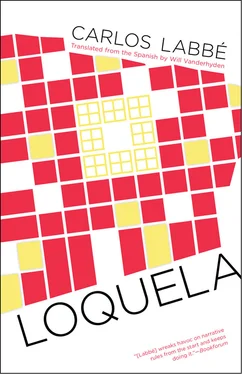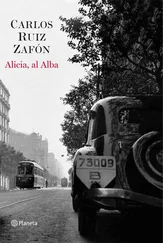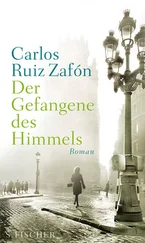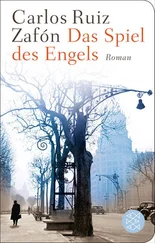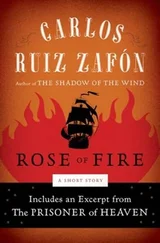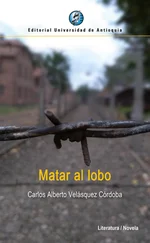The next day, Alicia walked eleven steps in a straight line past the kiosk toward the ocean, she sat down and did her best to find the exact words to describe each wave until they came to form a single wall of water that broke without ever ceasing to break, immobile in the moment that the foreign couple approached, walking along the beach. They looked exhausted; he rolled up his pants and she sat down and looked out at the sea without saying anything. Behind them, Alicia — dressed in a black dress and dark sunglasses as if acting out the joke she’d made: this seems like a job for a private detective — started unsuccessfully to write down every gesture the couple made: she lifts her hand and touches his mouth, brushing away a stain on his face that looked like sand, but then it’s darker — her finger’s shadow, I suggested, but Alicia raised her voice to tell me no; it’s a minute drawing in black pencil — and he’s unfazed when she skillfully draws lines on his face, so quickly that he doesn’t even discover the pencil against his cheek until she stops, she kisses him and says something in his ear.
You know, Alicia says to me, the two of us trying to fix movement using words and she, the cunt, adds a drawing to our picture, three lines — the sand, the waves, and the horizon — and two points — the sun high on his face and an unknown figure moving off down the beach. That slut ruins our chance to halt what’s spinning in circles, vibrating, shaking, ending up on the page convincing us that, nevertheless, the world that falls on top of us can also be suspended. Sky, sand, sea, wave cease falling; they stay still around us and we’re able to sit on the sand, dive into the sea, ride the wave, never lose sight of the stars that begin appearing in the sky, and in this way we save Neutria. You know, yells Alicia: that little bitch isn’t stupid like us; she draws, tattoos, marks the body she adores with a figure that doesn’t change, and no one will ever even turn these pages. Then the couple heard our voices. Their eyes turned curiously toward me, and I could clearly make out their faces; perhaps you can guess whom they resembled. Every morning you went with me to walk on that beach, that day you heard a shout behind us, you saw me walking toward the kiosk and also returning home with the notebook under my arm, looking calm, though in truth we ran at full speed, Alicia and I, laughing. She chided me in a low voice: but that’s the boy from the university, the one writing the novel, the one who stares at you in class. You were with him every morning, you little minx. I’m jealous, why didn’t you tell me?
Elisa came back with two cheap popsicles. Carlos removed the wrapper on his and they ate it together. The other popsicle melted after a few hours on the bench in the plaza where they spent the afternoon. Elisa lay her head down across his knees and without intending to she fell asleep. A while later the cold woke her. It wasn’t Carlos’s knees that she felt under her head, but a jacket, his jacket, shaped into a pillow. Just before opening her eyes she’d believed she was in bed, but the bench’s boards materialized and she remembered where she was. Another false alarm she said to herself, just like when she was little and stayed at her cousins’ house in Viña de Mar: she thought she was waking up in her own room in Santiago, but then she heard breathing, the sea in the background, and her Aunt Pepa coming up the stairs to wake them for breakfast. For a second — before discovering that Carlos had left her alone, sleeping in the plaza — she thought that, like before, she’d been mysteriously transported to some hostile place in middle of the night. Nearly desiccated trees, poorly pruned shrubs, the gardener hosing down the street, and the old man pretending to read the paper but actually ogling her, all of it added to her disappointment.
She ran her hand over her face and sat up. A pair of men whistled at her from a distance, at her or at someone else, then disappeared. It was late. Shivering, she put on Carlos’s jacket. She stretched her legs out over the gravel and looked around. The old man on the bench had put his newspaper away inside his wool jacket. She looked around for Carlos, she saw some workers playing a game of pickup soccer with a rubber ball. A few of them, freshly showered, had come from the building that was under construction near Carlos’s home-studio; some days, looking out the window, she’d see them leave, all spruced up, heading out to a bar. She got up. Her head hurt and she was anxious to tell off that old degenerate: the one who’d been staring at her all this time. She started walking.
Suddenly she was in front of a bar. She stood still, staring at the glass of the display window where the specials were written in white and red marker: half-liter beers 500 pesos, chicken and fries 1,000, beer and a hotdog 890. She looked at her face, still swollen with sleep. For a second, she glanced past her own reflection and a man appeared, drinking a beer, his eyes fixed on the wall. It was him. When Elisa entered the bar, Carlos was watching a pretty girl come in through the doorway and walk toward his table. In the neon light he discovered it was Elisa, her face hard, pulling back a chair and sitting down across from him. She moved aside two bottles that were apparently in her way and asked him dryly what’d made him decide to leave her on that bench, alone and sleeping. Better to have offered her up for a million pesos to the construction workers who whistled at her every time she passed by on her way home. Carlos asked her to forgive him. He gestured to the woman cleaning the mirror behind the bar: one glass, please. All was silent as Carlos emptied the bottle into the glass and offered it to Elisa, who turned it down with a raised hand and a tsk of her tongue. She pushed back her chair intending to leave, but Carlos took her arm and spoke: she had fallen sound asleep when the organ grinder started his song. And he’d experienced an urge to learn the man’s name, to exchange a few words with him, after all Carlos could hum from memory the melody the organ grinder played every week in the neighborhood. Then he decided he’d give him a coin — he’d never done so before — with the secret hope that he’d be allowed to turn the crank on the apparatus. It’d only take a couple minutes; he hadn’t meant to leave her alone for anything in the world. He’d laid her down on top of his jacket — she was sleeping soundly, he’d said this already — and headed toward the organ grinder, who’d just finished his second melody and, as usual, was pausing for a moment to accept coins from passersby. As he approached he couldn’t help but stare at the girl talking to the organ grinder, who listened to her very intently, nodding his head with every word she said. It was the albino girl. The albino girl, he repeated, and he’d seen her face before. Perfectly calm, he handed the organ grinder 100 pesos so he could listen in on their conversation: she said that it was a deal then, that he better not leave her expecting, this comment made both of them laugh quietly. The albino girl said goodbye and began walking rapidly away. When Carlos caught up to her, he asked if she was Violeta, Alicia’s friend, and she smiled, glanced up, as if noting his hair color, and nodded her head. Carlos paused. He stared at Elisa, who was drinking her beer now, her eyes never leaving his. She was certain he wouldn’t tell her everything. He’d wanted to tell Violeta who he was — her friend’s cousin — but she didn’t show the slightest interest in his words, I know, I know, she said. They were silent, Violeta turned and walked toward Providencia; she didn’t look where she was going, her attention on Carlos, walking beside her. Then he asked her what she was carrying in her hand. A magazine founded by some of her cousin’s classmates, she said: they’d published a story she’d written. She handed him the stapled and folded photocopies. A gift. In that instant, as he thanked her and told her he’d read it, Carlos remembered Elisa, alone in the plaza. As if he’d betrayed her, as if he were betraying her, she thought. Violeta smiled for the first time, she moved her head again and murmured: See you, have a good one. She looked a lot like the albino girl from the novel, the one he’d been unable to find in his notebook; he told Elisa that he’d been thinking about the coincidence of their hair color as he headed back toward the plaza, walking, not running, why lie; she looked just like that unfathomable character that he heard in his head. At the stoplight he started flipping through the photocopied magazine. He was stunned when he read the title of her story: “The Wasted Night” by Violeta Drago. When he told her this, he silently looked for surprise on Elisa’s face, and yet he realized how hard it would be for her to comprehend what it was that had kept him from returning to the plaza, what made him go into the bar, buy a beer, and a second, and a third. The title and the plot corresponded to the most well-guarded story he’d ever written, a story he invented the painful night after his cousin’s wedding when, in the bathroom, he and Elisa had definitively stopped being best friends. The motivations mattered little, he thought, what was important was that in Violeta’s sentences the boy who is in love with his best friend was also named Carlos. Although in her version, the girl’s name is Beatrice, like in Dante’s paradise and unlike his own medieval tale, in which Carlos is a castle swineherd, Elisa a princess, and the curse is delivered from the mouth of a sinister court magician, who’s jealous of the seemingly idealistic yet inappropriate relationship that is beginning to blossom between heiress and servant in the kingdom’s springtime countryside.
Читать дальше
